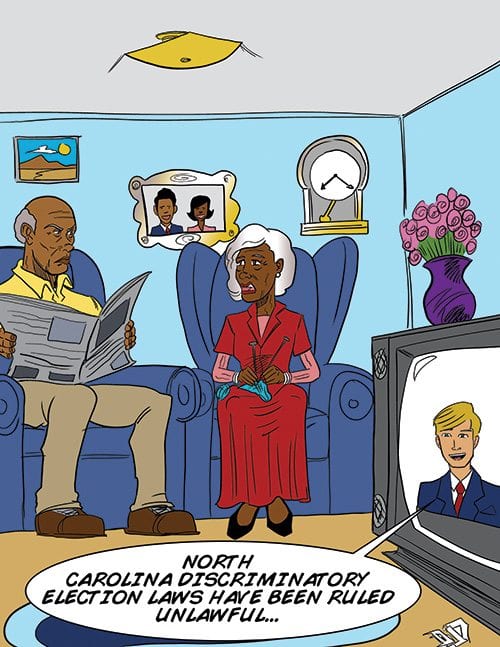
African Americans were delighted when President Lyndon B. Johnson signed the Voting Rights Act on Aug. 6, 1965, only five months after the “Bloody Sunday” protest on Edmund Pettus Bridge in Selma, Alabama. People thought that the battle for suffrage was finally over. The job now was to get blacks enrolled as voters and see that they turn out on Election Day. But another impediment to the development of black political power has emerged — redistricting that vitiates the black vote.
Also of concern are changes in the Voting Rights Act that make it easier for states to impose rules that affect the black vote. In the 2013 U.S. Supreme Court case of Shelby County v. Holder (133 S.Ct. 2612) many jurisdictions are no longer required to obtain preclearance before changing their voting rules. North Carolina took advantage of the change in the law and proposed revisions that were challenged by the Obama administration as well as by civil rights groups.
The new rules were found to be acceptable in the state courts but the ruling was overturned upon appeal to the three-judge panel of the U.S. Court of Appeals for the Fourth Circuit. The U.S. Supreme Court later decided not to hear the case upon appeal. Consequently, while supporters of black voting rights won this case, the opinion has little value as precedent for future cases, especially since all five sections of the proposed law were extreme and “disproportionately affected African Americans.”
The identification requirements of the new rules “retained only those types of photo ID disproportionately held by whites and excluded those disproportionately held by African Americans.” They cut back early voting from 17 to 10 days. They ended same-day registration and banned counting votes cast in the wrong precinct.
Even more damaging would be the establishment of voting districts in which the black vote is dispersed so broadly that even a substantial turnout would not increase black political strength. The strategy of devising political districts in a way to increase the vote of one party and reduce another usually causes the districts to be distorted in shape. Elbridge Gerry, the Massachusetts Governor in 1812, was a master of politically devised redistricting. The process has come to be known as gerrymandering.
Republicans have employed gerrymandering so effectively that they now control 66 percent of the nation’s statehouses. In Gill v. Whitford, a Wisconsin case before the U.S. Supreme Court, a three-judge panel of the Federal Court of Appeals has ordered the Wisconsin Legislature to redraw the district map for the state assembly because the map they have approved was gerrymandered in a way to violate the Equal Protection Clause of the plaintiff.
There is little doubt that Republicans will continue to use gerrymandering to minimize the impact of the black vote. The U.S. Supreme Court will probably determine in its fall session the limits on political redistricting. It appears that the battle to maximize the impact of the black vote is not yet over.
Voter registration is a conflict in the South that has cost many black lives. During the Memorial Day period, blacks should acknowledge the lives that have been lost in the battles within the United States to assert the right to vote of all citizens.


![Banner [Virtual] Art Gallery](https://baystatebanner.com/wp-content/uploads/2024/04/Cagen-Luse_Men-at-store-e1713991226112-150x150.jpg)



